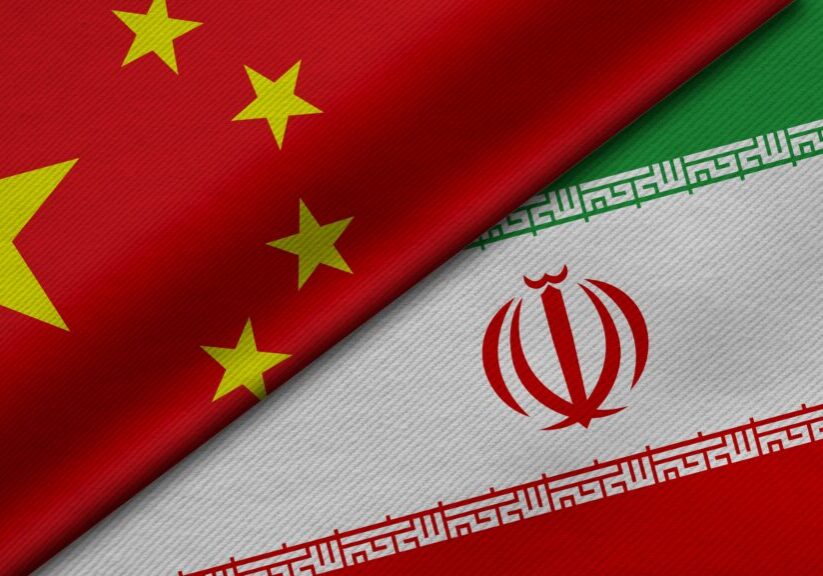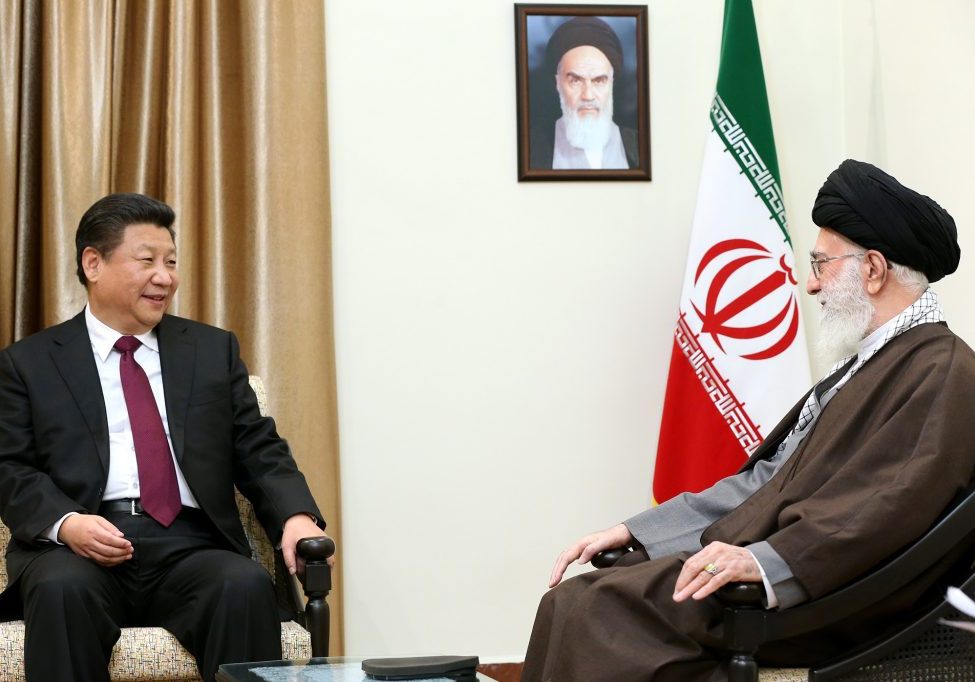Australia/Israel Review
China’s Quest for Jewish “Secrets”
Feb 4, 2016 | James Ross

James Ross
During my first trip to China in the summer of 1985, I visited English Corner in People’s Park in Shanghai one Sunday afternoon. It’s one of the places where young Chinese people used to practise their English with visiting foreigners. Officials from the university where I was teaching in Shanghai escorted me there, and a big crowd quickly gathered to talk with me – a tall, curly-haired foreigner – and pushed closer to shower me with questions.
Some of the questions seemed strange to me (“Do all Americans have AIDS?”) but most were routine, such as, “Where are you from? How do you like China? Are you married? Do you like Chinese girls?” After two months in China, none of this was surprising to me except for one additional question: “What is your religion?”
I was taken aback at first – it’s not a question I often hear when I travel abroad – but after a brief pause I answered, “I am Jewish.” The young questioner gave me a thumbs up and said, “Jews are the best.”
I got a similar question – and similar response – everywhere I travelled in China later that summer: Kunming, Chengdu, Nanjing, Suzhou, and Guangzhou. My unscientific survey suggested that the Chinese liked and admired Jews, although they didn’t seem to know much about them. I knew that there had been Jewish communities in Shanghai and other Chinese cities until shortly after WWII but that there was little evidence of their presence after the Communist takeover in 1949. There were a handful of Jewish tourists and visiting faculty at the time of my first visit. But I was curious about how average Chinese people had developed an image, seemingly a positive one, of Jews.
I visited China several times after that summer, but it wasn’t until 2008, when I was selected as a Fulbright lecturer at Nanjing University, that I had a chance to explore the popular Chinese image of Jews. By then, there were many Jewish visitors and business people from the United States and Israel. And economic reforms were transforming the country. Making and spending money seemed at least as important as Communist ideology.
When I first arrived to teach in Nanjing in the fall of 2008, I was joined by Yan Li, a history graduate student from my home university who had been staying with her family in Beijing. Yan and I visited bookstores throughout the city. We started at a small bookstore that featured books about evangelical Christianity. Yan asked the young woman who worked there if they had books about Jews, but the clerk had trouble answering the question. She didn’t know what Yan meant by “Jew.”
At larger bookstores, we found entire sections devoted to books about Jews. Most of the books focused on finance, such as 16 Reasons for Jews Getting Wealthy by Chu Ke; The Secret of Talmud: The Jewish Code of Wealth by Jiao Yiyang; and Secret of Jewish Success: Ten Commandments of Jewish Success by Li Huizhen. Yan helped me translate the books and we found they were filled with misunderstandings and stereotypes. And books purporting to be based on the Talmud were mostly pithy sayings about wealth with little or no connection to actual Talmudic passages.
Some of the misunderstandings are almost comical. One of the best-selling books is What’s Behind Jewish Success by Tian Zaiwei and Sha Wen. “It is said that Jews are distinguished by their noses,” the authors write. “All Jews have hooknoses. This is not accurate. Despite hook-nosed Jews in cartoons, only Jews in Russia and the Near East have hooknoses in real life.” They also write that “to save time, Jews never beat about the bush in negotiations as Chinese often do.” Jews control the diamond market, the authors also write, since diamonds are “valuable and easy to carry which is ideal for Jews who are always drifting.”
The most prominent author and editor of Chinese books about Jews is He Xiongfei, who identifies himself as a literary critic, orator, Jewish studies expert, and visiting professor at Nankai University. He is director of Xiongfei Limited in Hainan and has edited a number of book series on intellectual, literary, and cultural studies. His most popular series is titled “Revelations on the Jews’ Superior Intelligence,” launched in 1995. His books include Jewish Wisdom of Family Education: The Cultural Code of the Most Intelligent and Wealthy Nation in the World (2005); Secrets of Jewish Success: The Golden Rule of a Miraculous Nation (2004); and Uncovering the Enigma of Jewish Success in the World (2002). He also has edited Collection of Jewish Strategies (1995); Jewish Life of Money (2002); Jewish Magnates of Ideas (1995); Legend of World Famous Jewish Celebrities (1996); Riddle of Jews (1997); and Jewish Bigwigs’ Skills of Making Money (1996). His most recent publications are cartoon books for children about Jewish wisdom and the Talmud.
In the best-seller The Spirit of Jewish Culture (the English title on the cover is What’s [sic] Behind Jewish Cleverness) by Sai Ni Ya, one of He Xiongfei’s pseudonyms, he writes that Jews “are the most intelligent, mysterious, and the wealthiest people in the world. In a sense, not knowing about Jews equals not knowing the world! When Jews sneeze at home, all the banks in the world would catch a cold one by one. Five Jews together can control the gold market of the humankind; the antagonism between the East and the West, in a sense, can be said to be that between two Jews – Jesus and Marx.” The book continues with a series of lessons. Lesson 1 tries to define “who is a Jew.” It starts by discussing maternal descent then states:
Yet the chief criterion is whether one’s religion is Judaism. In the Jewish perspective, Judaism and Jews are integrated – Jews are the materialisation of Judaism and Judaism is the spiritual kernel of Jews. Thus Jews have identified themselves with Judaism: those who believe in Judaism are Jewish, and Jews all believe in Judaism. This outlook that unifies religion and ethnicity is closely related to their unique history and experiences. It is not because of religious radicalism.
These oversimplifications are typical of He Xiongfei’s work. Other lessons focus on Jewish rituals, such as circumcision, and great Jewish figures in philosophy, finance, science, art, and politics. (He mistakenly identifies a number of people as Jews, such as the Rockefellers.) Another lesson discusses antisemitism:
[T]his hatred toward Jews has gone deep into most non-Jewish people’s consciousness with no sensible reason and has been passed down from generation to generation. Jews have become the object of persistent and conventional worldwide hatred and genocide. Orthodox Jews are charged with ethnic chauvinism; Jews being assimilated are accused of being the Fifth Column of contaminating non-Jewish people by way of assimilation; rich Jews are regarded as the vampire of the nation; poor Jews are looked down upon as the burden of society…
The main reason for this hatred is their “Jewishness,” he writes. Their belief in one god is “so conceited as to be disrespectful of gods of other religions. Their ‘Jewishness’ is also embodied in their strict adherence to the 613 doctrines, which has made them an eccentric community that is hard to coexist with and merge into other cultures.” There is also a brief lesson on the Torah and chapter on Jewish humour.
He Xiongfei was a Buddhist who eventually turned to Christianity through his study of Jewish culture. In an interview with Christian Times, he discussed his feelings toward Judaism:
Though I have long since studied the Jewish culture, I always have a feeling that I am a spectator rather than a practitioner. Through my study I know the progenitor of Jewish culture is God. If you do not believe in Him, all of the study are in vain, so I think it is imperative to accept God if I want to study the Jewish culture, otherwise I will remain a spectator for good.
He also developed new ideas and patterns for his “Project of Jewish Education.” With projects like “Bar Mitzvah: Training Camp of Jewish Wisdom,” he hopes to help more Chinese children get an opportunity not merely to learn Jewish wisdom but also to know God. The interviewer referred to He Xiongfei as “the doyen of Jewish education in China.”
Another popular book is The 101 Business Secrets in Jews’ Notebook by Zhu Xin Yue. It suggests that the Jews’ systematic experience and knowledge are part of their secret for creating wealth. In addition, Jews are born with the ability to make money.
There is a classic saying that ‘the world’s money is in the pocket of Americans while the Americans’ money is in the pocket of Jews.’…For smart Jews, everything has its own value, and everything can be regained except priceless wisdom… The most important point is Jews’ attitude toward money. In their view, money is the gift for God rather than something shameful. You can get respect, high social status with enough money.
Other popular book titles include The Secret of Talmud: The Jewish Code of Wealth by Jiao Yiyang; Secret of Jewish Success: Ten Commandments of Jewish Success by Li Huizhen; Stranger from Mars: Nobel Prize and Jews by Yang Jianye; Voice of Wisdom: Speeches of Jewish Celebrities by Yu Xin; and Jewish Conspiracy of Destroying the World by Zhang Daquan.
Most of the Chinese authors who write about Jews really don’t know much about them. They use the success of Jews, especially in business and education, to promote values the Chinese traditionally cherish, such as hard work and knowledge or, in China’s burgeoning market economy, getting rich. Perhaps the Chinese are fascinated by the characteristics they see in Jews that correspond to their own concepts and outlooks.
Some of the books available in China have been translated from English, including Jack Rosen’s Jews: The Secrets to their Success. Many other books about Jews that are popular in China have been translated from Japanese. Japan, like China, has had a long fascination with the Jews and also has virtually no Jewish population. Best-selling books blame international Jewish cartels and conspiracies for Japan’s economic problems. Masami Uno, a leading Japanese antisemite, has sold more than one million copies of two books, If You Understand the Jews, You Will Understand the World and If You Understand Jews, You Will Understand Japan.
Best-selling Chinese books have been filled with outrageous claims about Jews for decades. Most of the claims create a positive attitude about Jews, but they also perpetuate stereotypes and misunderstandings about how Jews make money and raise their children.
In recent years, however, much of China’s popular discussion on Jews and Judaism has appeared on blogs. In a July 2012 blog titled “Jewish Education,” Wang War writes that the “Jewish nation is the world’s smartest, richest and most mysterious nation.” He cites Marx, Darwin, Freud, Einstein, and Mendelssohn as “Jewish gurus,” notes the high number of Jewish Nobel Prize winners, and praises Jewish success at business. “Seventy percent of world trade is controlled by the Jews,” he writes, and Jews account for 25% of the 400 richest Americans. “It is said that most of the world’s wealth is in the pockets of the Jews,” writes Wang.
One of the main sources of Jews’ success, according to Wang, is education. Learning and education are “spiritual beliefs,” he writes, and part of the “national spirit.” In Israel, Wang writes, pregnant women are always singing, playing the piano, and reading from mathematics textbooks. He also writes about the myth that Jewish mothers place a drop of honey on the Bible and have their young children lick it off so they learn the Bible is sweet. In “How to Train Children to Study Jewish,” another blogger writes that “in every Jewish family, shortly after birth, the mother would read ‘the Bible’ (Hebrew Bible) to him. And after reading each paragraph, let the child lick honey. When a child is slightly bigger, the mother will present the ‘Bible’ with little drops of honey on top, then have the child lick honey off.” (A similar myth is repeated in evangelical Christian websites.)
Wang also writes about the respect Jews have for teachers: “In the Jewish community, teachers are even more important than the father. If both father and teacher are sent to jail and only one person can be rescued, then the child will decide to rescue the teacher, because teachers impart knowledge in the Jewish community.”
A similar blog, “How to Train Children to Study Jewish,” repeats these myths. The author, who is not identified, writes that “in ancient times, many Jewish cemeteries were often stocked with a variety of books, because the Jews believe that in the dead of night, dead people will come out reading, which of course is impossible. But it has a certain symbolic significance: even at the end of life there is a never-ending quest for knowledge.” (This is apparently based on a misunderstanding of the Jewish custom of burying damaged prayer books and sacred documents.)
The blog also notes: “The Jews are indeed a great race and account for America’s 200 most influential celebrities, Jews account more than half of the 100 Nobel laureates; one-third of the professors at prestigious universities in the United States; one quarter of the nation’s lawyers; 60 percent of the nation’s leading writers of literature, drama, and music; and one half of the world’s richest entrepreneurs and one-third of the millionaires in the United States.”
Although many of the blogs are exaggerated or false in their praise of the Jews, some seem openly antisemitic. One recent blog suggests the Germans traditionally hated Jews because they believed the Jews killed Jesus but in Hitler’s time they despised Jews because of their prosperity. Another blogger wrote that Germans believed Communism was the beginning of a Jewish conspiracy to conquer Germany and the rest of the world.
Stereotypes about Jewish wisdom are common topics in Chinese blogs. Blogger Zhou Biao speculated in October 2009 as to why so many Jews have won Nobel Prizes in science and literature. (The Jewish Virtual Library notes that 193 of the 855 Nobel Prize honours have been Jewish [about 22%] since the prize was first awarded in 1901. Jews make up less than 0.2 percent of the world’s population.) Zhou Biao suggested that “misfortune” is probably the reason. He notes that Jews [actually, ancient Hebrews] were slaves in Assyria and Babylon and that their cities were destroyed by the Roman Empire and they were driven out.
“Later in the Middle Ages,” Zhou Biao wrote, “they had to survive in the Islamic world and Europe ruled by Christianity where their legal and political status were very low, many rights were deprived of, even sometimes they might suffer expulsion and genocide. Faced with the difficult situation which lasted for at least two thousand years, they were forced to develop a unique lifestyle.”
He then discussed Medieval Europe and how Jews did not have the right to own land and that “forced them to turn to more knowledgeable and skilful industries, such as the handicraft industry, financial industry and so on…” Jews used their savings, he wrote, to develop the lending industry and, “because of their instability and high risk, the decent middle class despised them.”
In the capitalist era, Zhou Biao wrote, “the inferior position of the Jews can quickly turn into a huge advantage.” He compared this with unemployed and educated youths in China who succeeded under Chinese economic reforms in the late twentieth century. “The Jews are the pioneers of business and they have done business for two thousand years,” he wrote.
Zhou Biao argues that Jews did not have financial support from states or other organisations but succeeded because they were “far from power, casting off the control and keeping tolerance and independence.”
Another blogger, Liu Kai, discussed the “unique family education” of the Jews in his posting. For the Jews, he writes, “their property is not money but books since books are carriers of knowledge…[E]very Jewish child likes reading. When they grow up, parents put books everywhere to make sure that their children could reach them anytime.”
In his blog post “Why are Jews so clever?” Gao Feng suggests that diet and “fetal education” are keys to Jewish success. He notes that “all Jews firmly believe when meat and fish are mixed together, it will do harm to their body.” [Ed Note: In fact, of course, Jewish dietary laws forbid mixing milk and meat. Fish is considered “parve”, meaning it may be eaten with either meat or milk.]
Stereotypes and misinformation about Jews remain widespread in China. But they seem to have inspired admiration for Jews, rather than antisemitism. Despite the lack of a significant Jewish presence in China, Jews remain a model for success.
Excerpted from The Image of Jews in Contemporary China: An Identity Without a People, edited by James Ross & Song Lihong, copyright 2016 by Academic Studies Press. This article is reprinted from Tablet Magazine, at tabletmag.com, the online magazine of Jewish news, ideas, and culture. © Tablet Magazine, reprinted by permission, all rights reserved.
Tags: China






